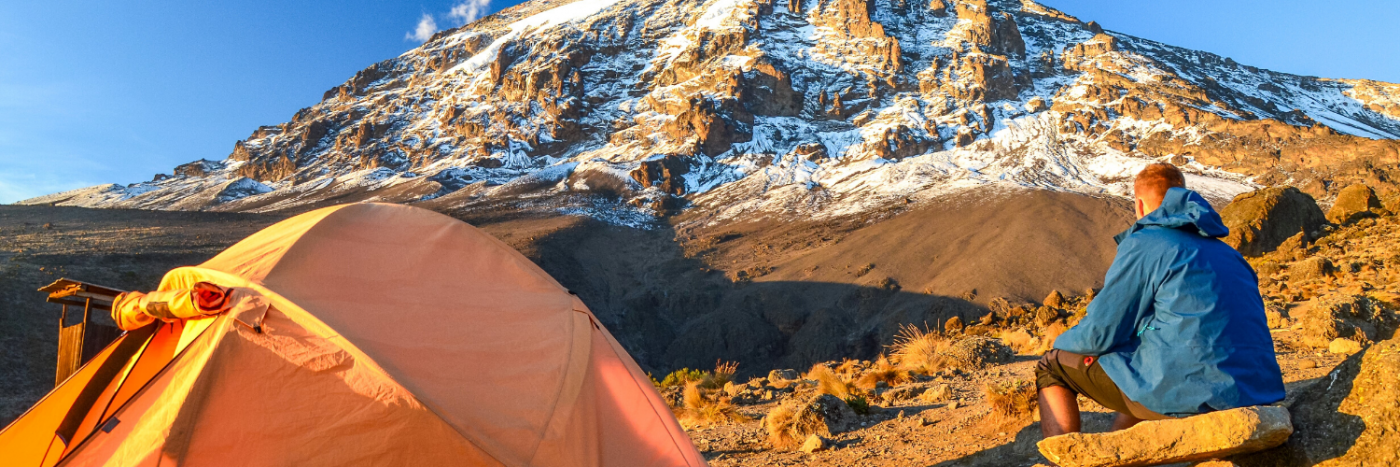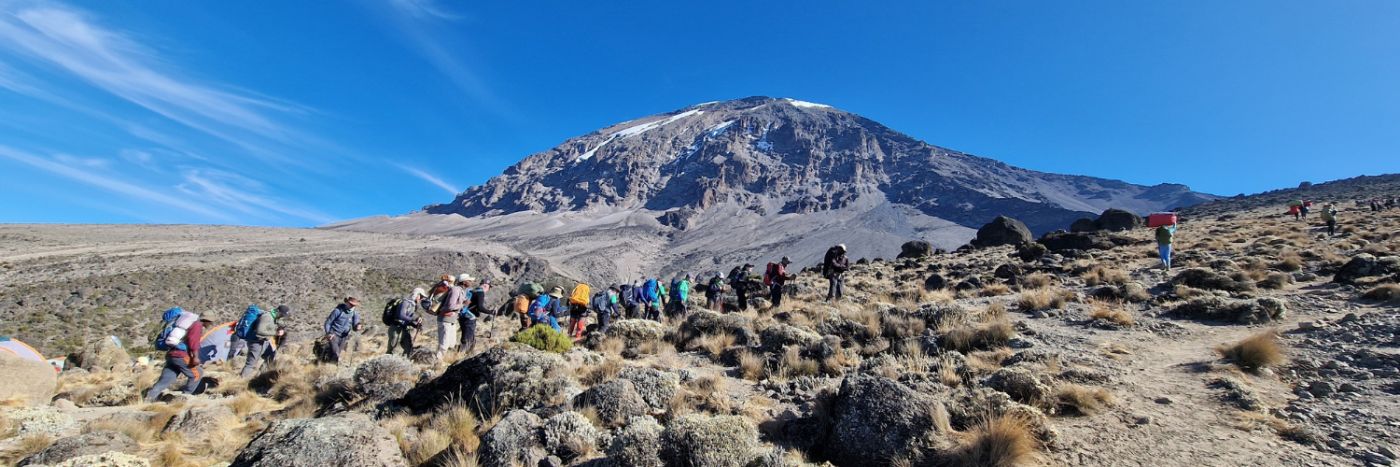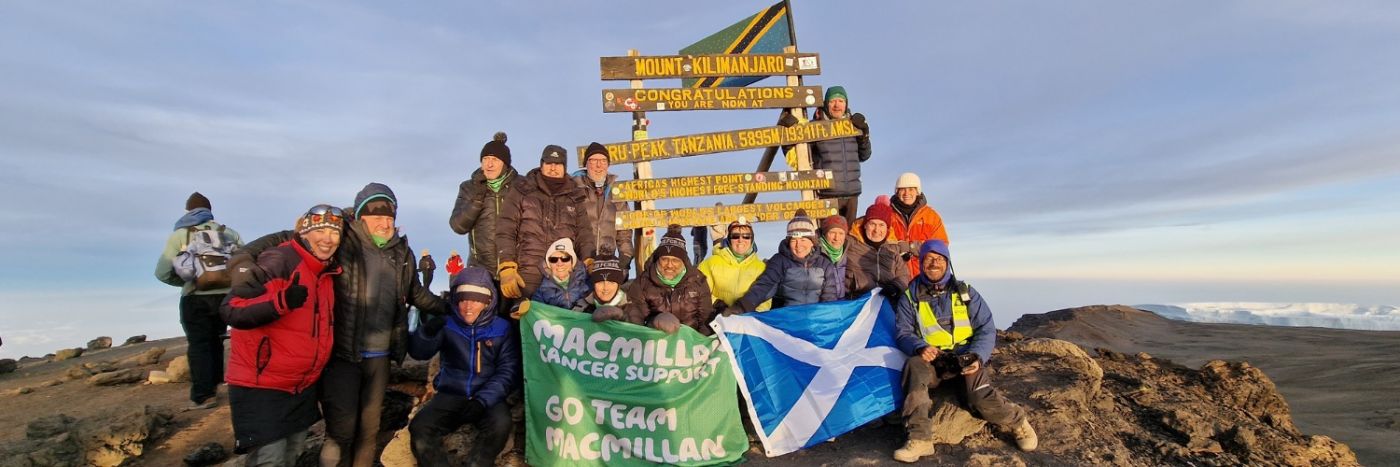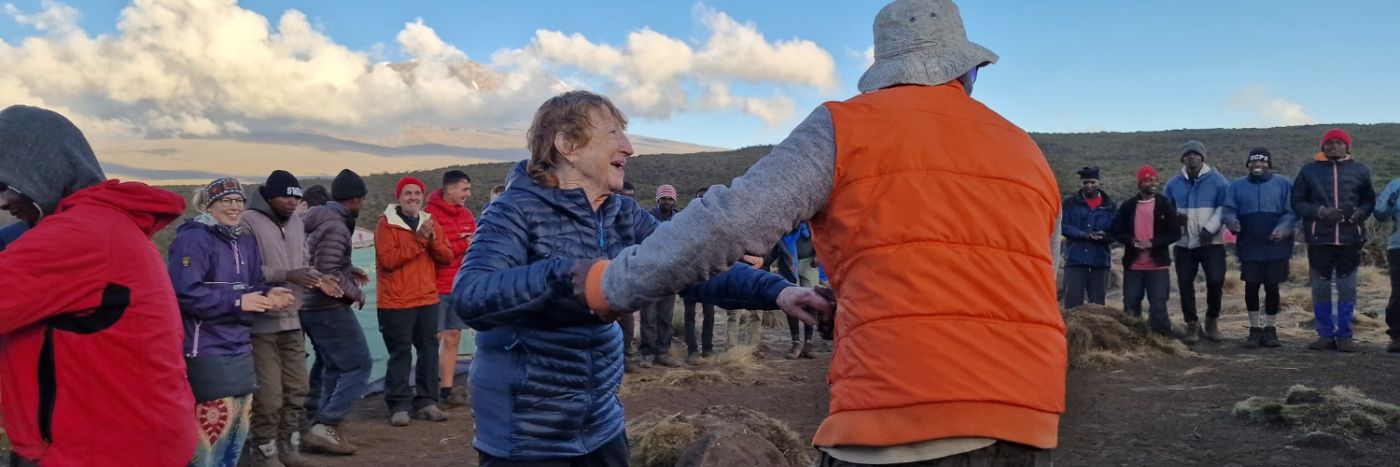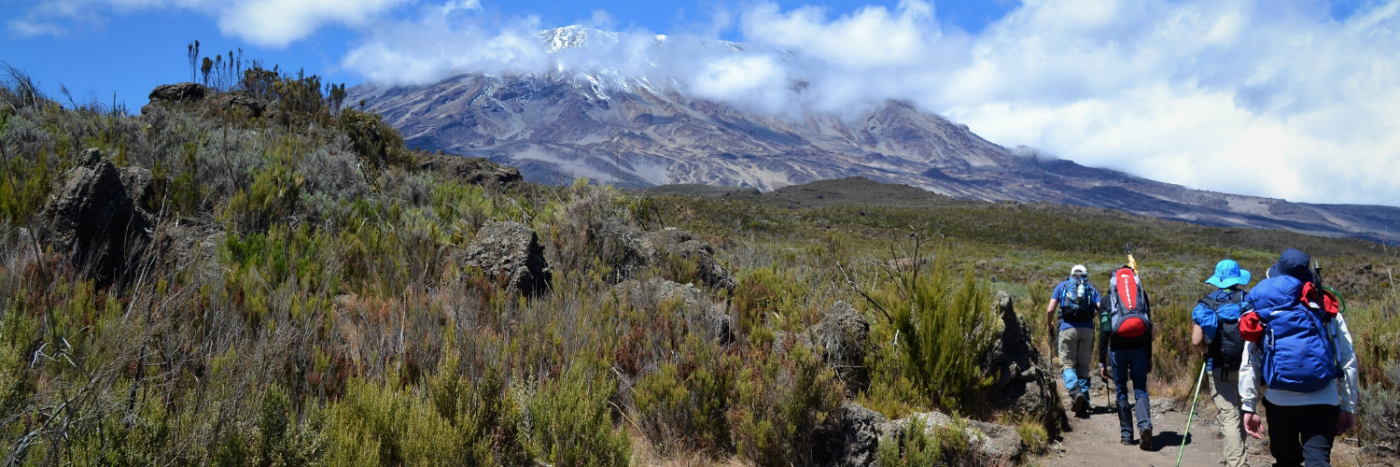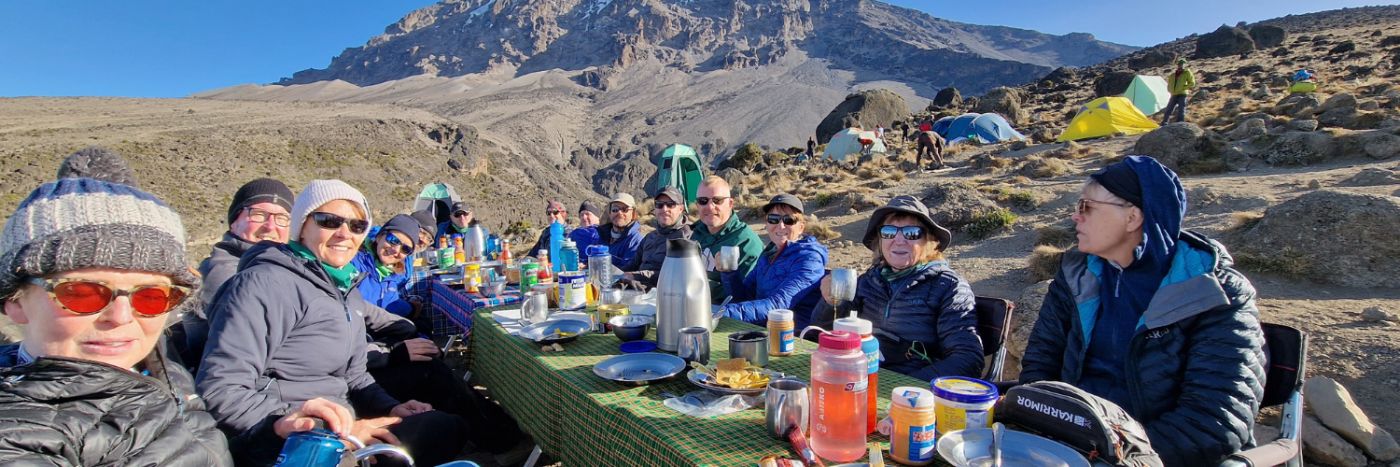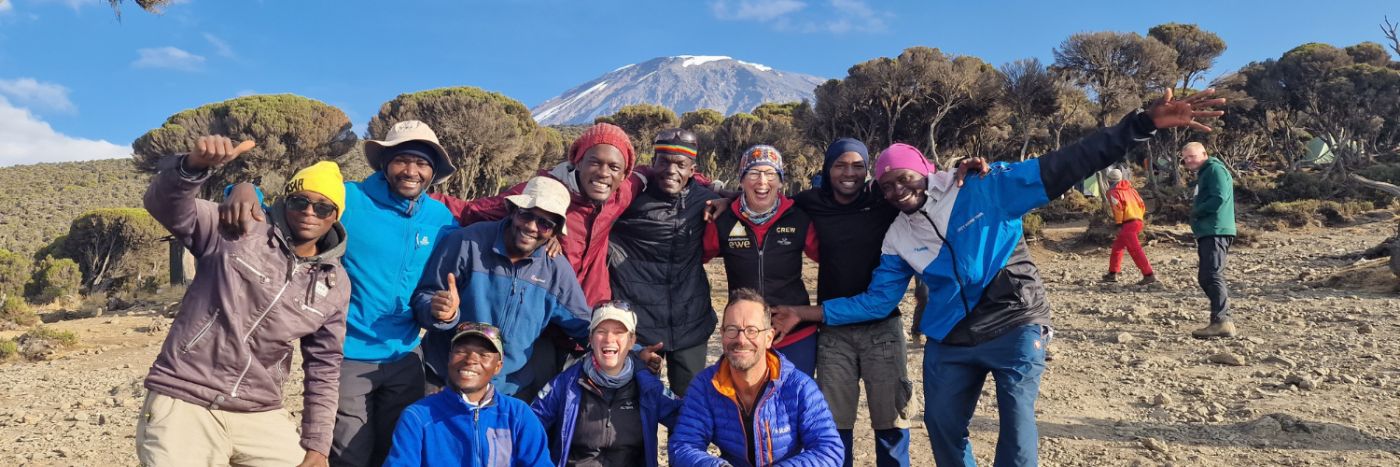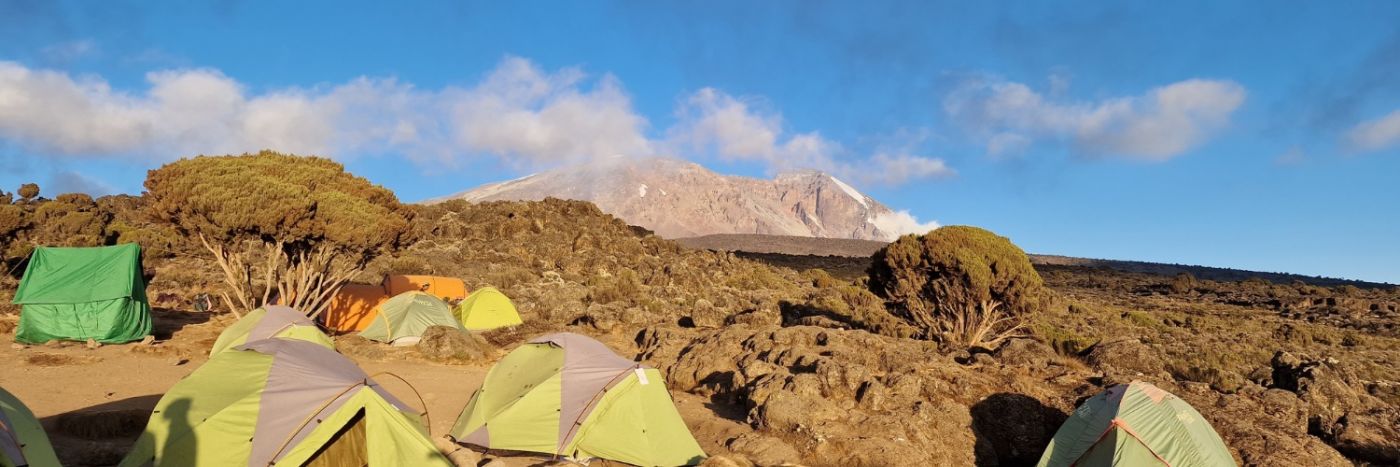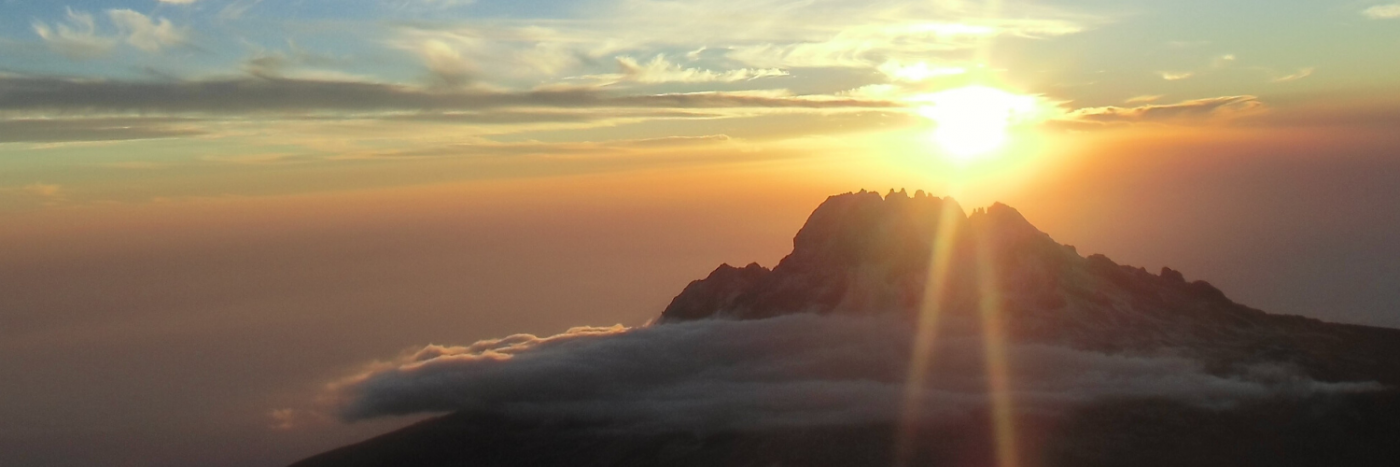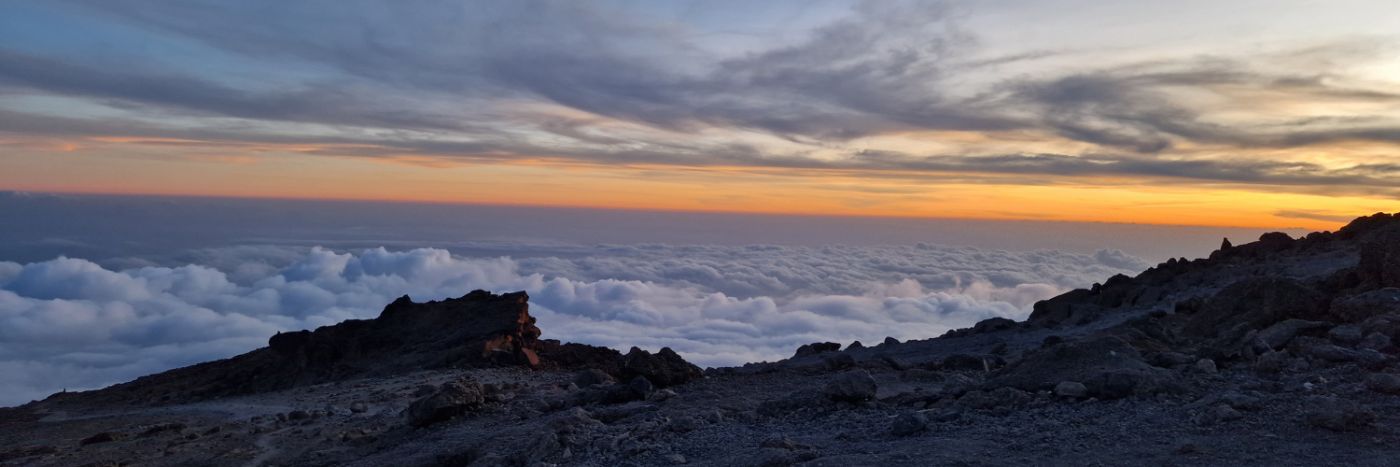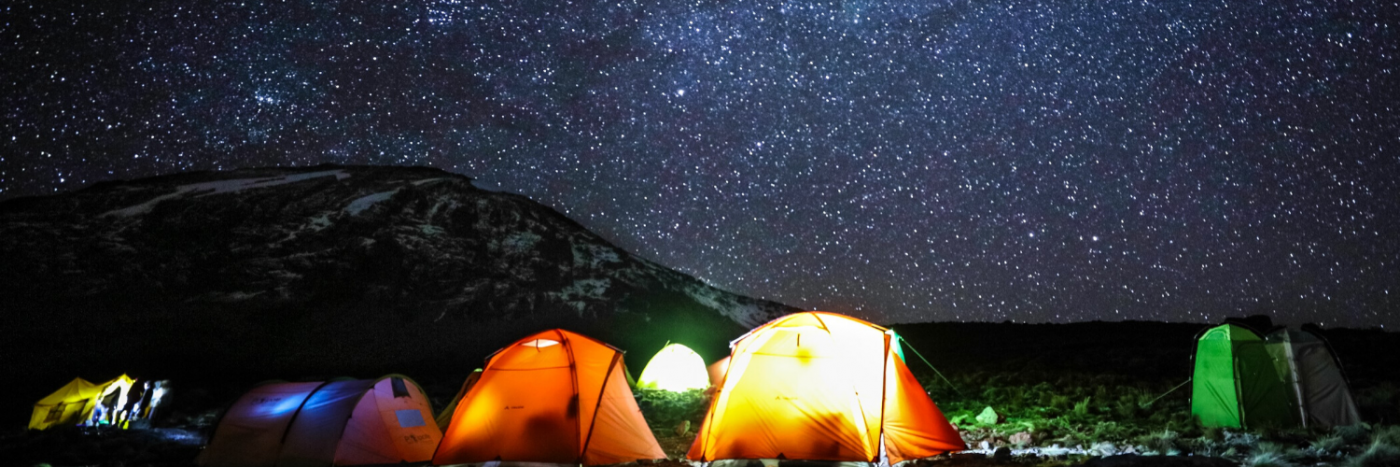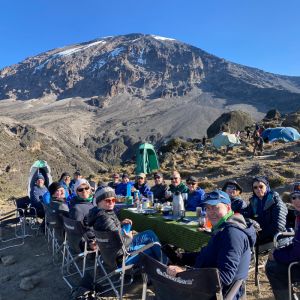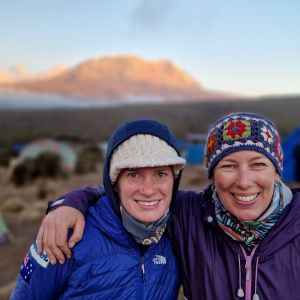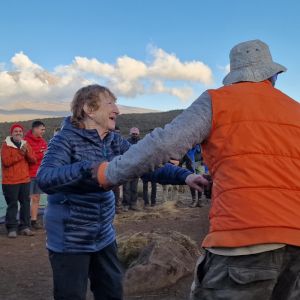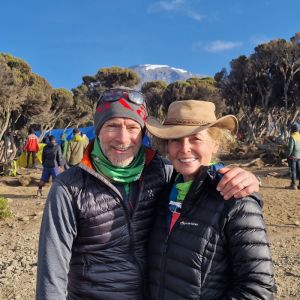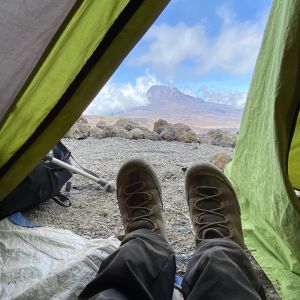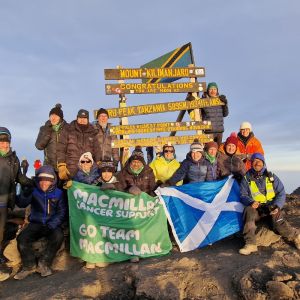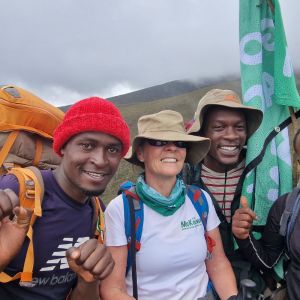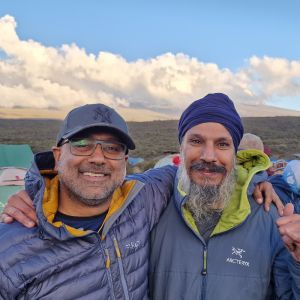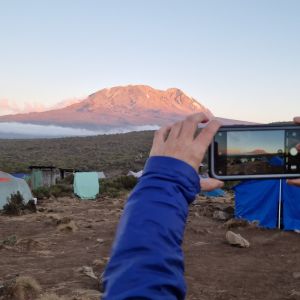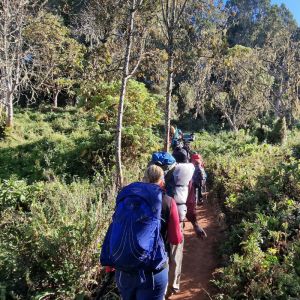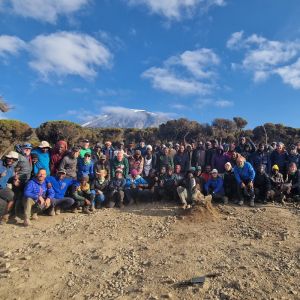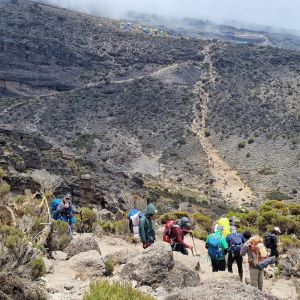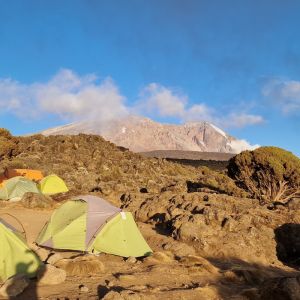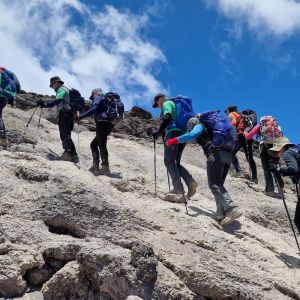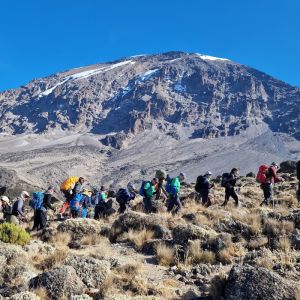- Overview
- Map & Itinerary
- Essential Info
- Pics & Vids
- Dates & Prices
Highlights
-
Private Kilimanjaro Trek for PwC in support of Mental Health UK
-
Trek the Rongai Route – a quieter northern approach with an extra day for acclimatisation
-
Stand on the summit of the world’s highest freestanding mountain at 5,895m
-
Camp under star-filled skies and the Milky Way
-
Experience the relentless energy and support of our amazing local crew
- Overnight at Hans Meyer Base Camp (5,150 m) beneath Kibo Peak, perfectly positioned to make the summit push more manageable
-
1:2 guide-to-trekker ratio on summit night
-
Free Water-to-Go bottle to help reduce single use plastic in Tanzania
-
Get top tips on packing, kit, and responsible travel.
Overview
Join PwC’s private expedition to summit Mount Kilimanjaro in support of Mental Health UK – a powerful journey for PwC staff combining personal challenge with a meaningful cause to help everyone’s mental health.
Standing tall at 5,895m (19,340ft), Kilimanjaro is the highest freestanding mountain in the world, rising from the plains of Tanzania with its iconic summit sign & glacier and three volcanic cones: Shira, Mawenzi and Kibo.
Your 7-day trek follows the quieter Rongai Route – the only trail approaching Kilimanjaro from the north, near the Kenyan border. This quieter path is renowned for its diverse scenery and the unique opportunity to pass close to Mawenzi Peak, with breathtaking views across the Amboseli plains into Kenya.
Climbing Kilimanjaro is like journeying from the equator to the North Pole in just one week. You’ll trek through five distinct climate zones – lush rainforest, heath, moorland, the lunar alpine desert and finally the arctic summit – each day bringing new landscapes, wildlife and challenges.
Guided by our UK Mountain Leader and our phenomenal local Guides & Crew – whose warmth, knowledge and encouragement are second to none – you’ll be in expert hands every step of the way. To give you the best chance of success, this itinerary includes an extra acclimatisation day and a 1:2 guide-to-trekker ratio on summit day for maximum support and motivation when it matters most.
As dawn breaks over the glaciers and you take your final steps onto the Roof of Africa, you’ll experience a moment of pride, perspective and pure exhilaration. This is more than a mountain – it’s a journey of resilience, teamwork and doing something extraordinary together.
You’ll also be trekking responsibly. From your free Water-to-Go bottle to help eliminate single-use plastic, to our commitment to fair porter treatment and supporting environmental charity Cool Earth, this adventure is designed to leave a positive impact on both people and planet.
Fly from the UK to Kilimanjaro International Airport
Overnight flight
International flights are not included in your Kilimanjaro package, giving you the freedom to choose your departure airport and extend your time in Tanzania if you wish.
We’ll share the recommended flights for this trip so you can make use of the included group airport transfer on arrival. Flights can be booked through our trusted ATOL and ABTA-protected Flight Agent for added convenience and peace of mind.
Arrival and pre-trek briefing
A warm African welcome awaits you at Kilimanjaro International Airport, where you’ll be met by our team and transferred to your hotel near Moshi, the gateway to Kilimanjaro.
Please note: One group transfer is provided at a designated time. If you’re arriving outside this window, you’re welcome to arrange your own transport or book a private transfer through us for an additional cost.
Once checked in, you’ll meet your fellow trekkers and your Adventurous Ewe UK Mountain Leader & Local Guide for a full pre-trek briefing, kit check and final prep. Then it’s time to enjoy a welcome dinner and rest up – tomorrow, the real adventure begins.
Included
Transfer: Airport transfer (designated time)
Accommodation: Hotel (twin share basis)
Meals: Dinner only
Begin the climb: Nalemoru Gate (2,000m) to Simba Camp (2,650m)
Today marks the start of your Kilimanjaro journey. After an early breakfast, you’ll set off for the scenic drive around Kilimanjaro to reach the village of Rongai, close to Tanzania’s border with Kenya. The route takes you through Marangu and then north, passing a series of interesting settlements and offering your first views of the mountain’s slopes.
At Rongai, you’ll complete your Kilimanjaro National Park registration and meet the rest of your trek team before starting your journey on foot.
The trail begins at about 1,950 metres, winding pleasantly between farmland planted with maize and potatoes and gradually climbing into the pine forest. Keep an eye out for striking black-and-white colobus monkeys moving among the trees as you make your way higher.
By early afternoon, you’ll arrive at Simba Camp, set at the edge of the moorland zone, where you can settle in and enjoy a hot meal.
Elevation:
1,950m to 2,650m
Distance Covered:
6–8km (4–5 miles)
Approx. Time:
4–5 hours trekking
Meals included:
Breakfast, lunch & dinner
Simba Camp (2,650m) to Second Cave Camp (3,450m)
Your second day on the mountain. After breakfast, you’ll continue your gradual ascent into the open moorland. Today’s trail climbs steadily, offering wide-reaching views back across the forest and plains.
As you gain height, you’ll be treated to superb panoramas of Kibo’s majestic summit and the Eastern ice fields shimmering along the crater rim.
Around midday, you’ll reach Second Cave Camp, where you can rest, refuel, and take in the dramatic landscape that surrounds your campsite.
Elevation:
2,650m to 3,450m
Distance Covered:
5km (3.1 miles)
Approx. Time:
3–4 hours trekking
Meals included:
Breakfast, lunch & dinner
Second Cave Camp (3,450m) to Third Cave Camp (3,880m)
After breakfast, you’ll leave the moorland behind and continue your steady ascent into a striking semi-desert landscape. The trail offers fantastic views of Kibo, the highest of Kilimanjaro’s three volcanic cones, and its gleaming Eastern ice fields.
Today, you’ll leave the main route behind Mawenzi Peak and head across quieter terrain towards your next campsite. By early afternoon, you’ll arrive at Third Cave Camp, where you can relax, enjoy dinner, and rest up for the days ahead.
Elevation:
3,450m to 3,880m
Distance Covered:
5–9km (3–5 miles)
Approx. Time:
3–4 hours trekking
Meals included:
Breakfast, lunch & dinner
Third Cave Camp (3,880m) to Kibo Hut (4,750m)
Today, you’ll set out across the barren, otherworldly landscape of the “saddle,” the broad expanse of high-altitude desert that lies between Mawenzi and Kibo.
After a few hours of steady trekking, you’ll arrive at Kibo Hut, your spectacular base camp with the summit of Kilimanjaro towering in the background and tomorrow’s trail rising ahead.
The rest of the day is reserved for rest, hydration, and preparation for your summit push. In the late afternoon, there will be an optional acclimatisation walk to help your body adjust to the altitude.
Elevation:
3,880m to 4,750m
Distance Covered:
9km (5 miles)
Approx. Time:
4–5 hours trekking
Meals included:
Breakfast, lunch & dinner
Kibo Hut (4,750m) to Hans Meyer Cave (5,220m) – Acclimatisation Day
Today is all about getting your body ready for the summit push. Setting off early to avoid the midday sun, you’ll leave camp behind and begin the steep ascent across the stark, moon-like alpine desert towards Hans Meyer Cave.
This high-altitude section is rocky and demanding, giving you a taste of the final climb to Gilman’s Point and Uhuru Peak. Moving steadily at altitude will help your body adjust and boost your chances of a successful summit.
After reaching Hans Meyer Cave, you’ll return to camp to rest, rehydrate and prepare for the big day ahead. Depending on conditions and group progress, you may either stay here tonight or return to Kibo Hut for an additional night.
Elevation:
4,750m to 5,220m
Distance Covered:
3km (2 miles)
Approx. Time:
2–3 hours trekking
Meals included:
Breakfast, lunch & dinner
Hans Meyer Camp (5,220m) to Gilman’s Point (5,681m), Uhuru Peak (5,895m) & Down to Horombo Hut (3,700m)
This is it – summit day. The moment you’ve been preparing for.
You’ll set out around midnight under a sky scattered with stars, climbing steadily by headtorch into the cold, silent darkness. The first three hours are a steep ascent to the crater rim. Around sunrise, you’ll reach Gilman’s Point (5,681m), where the golden light begins to warm the landscape and reveal the vast expanse of the crater below.
With renewed energy, you’ll continue along the rim for another 1–2 hours to reach Uhuru Peak (5,895m), the highest point in Africa. Standing here is an unforgettable achievement – take time to savour the views and snap your summit photos.
After celebrating, you’ll descend back to Kibo Hut for a hot meal and a well-earned rest. Following a short break, you’ll continue your descent down to Horombo Hut (3,700m), where you’ll spend the night.
Distance Covered:
18km
Approx. Time:
9–12 hours trekking
Meals included:
Breakfast, lunch & dinner
Horombo Hut (3,700m) to Marangu Gate (1,860m) via Kilema Gate (2,950m)
Today marks your final descent from the mountain. Setting off after breakfast, you’ll walk down through the heath and moorland zone to Mandara Hut (2,700m), where a warm lunch will be waiting.
Afterwards, you’ll continue your journey back into the lush rainforest, listening to the sounds of birds and monkeys overhead. The trail leads you down to Kilema Gate – a wide, accessible route that’s easier underfoot and suitable for wheelchair users.
At Kilema Gate, you’ll say goodbye to your mountain crew and transfer by vehicle to Marangu Gate to complete your park exit formalities. From here, a short drive takes you back to your hotel in Moshi.
Once you arrive, you can enjoy a hot shower and maybe a celebratory beer or coke (not necessarily in that order) – reflecting on your climb and everything you’ve achieved. In the evening, gather with your team for a celebration dinner and a well-deserved night’s sleep in a comfy hotel bed.
Distance Covered:
16km
Approx. Time:
5–8 hours trekking
Meals included:
Breakfast, lunch & celebration dinner
Free morning and return home
Depending on your flight schedule, you’ll have a free morning to relax or explore. You might unwind by the hotel pool or hop on the complimentary shuttle into Moshi Town to pick up souvenirs or enjoy a fresh coffee. Moshi has a relaxed atmosphere and a unique mix of African and Asian influences, thanks in part to its roots as the centre of Tanzania’s coffee-growing region.
Later, there will be one designated group transfer to Kilimanjaro Airport, timed to connect with the recommended group flight home.
As you travel back, take a moment to reflect on everything you’ve achieved – from warm Tanzanian hospitality and spectacular landscapes to the feeling of standing on the summit of the world’s highest freestanding mountain. You’ll depart with a huge sense of pride and stories to last a lifetime.
Included
Transfer: To Kilimanjaro Airport
Accommodation: Not included
Meals: Breakfast
Arrive back in the UK
Return home with a deep sense of pride, a head full of memories, and stories to share for years to come. You’ve stood on the Roof of Africa, pushed your limits, and formed unforgettable bonds along the way. Welcome home.
Climbing Kilimanjaro is not only one of the world’s greatest trekking achievements – it’s also an opportunity to make a positive impact on the people and places you visit.
This trek has been thoughtfully designed to give you an incredible mountain experience while supporting local communities, conservation efforts, and responsible tourism practices in Tanzania. As you hike through five distinct climate zones to the Roof of Africa, you’ll gain a deeper appreciation of the mountain’s natural beauty, cultural heritage, and the people who call it home.
By choosing to trek with us, you’re helping to create sustainable income for local guides, porters, cooks and suppliers, many of whom rely on mountain tourism for their livelihoods. All crew are treated fairly, paid properly, and offered ongoing opportunities for training and development.
Kilimanjaro National Park itself is part of a growing national commitment to sustainable tourism. As a UNESCO World Heritage Site, the park is protected under Tanzanian law, with entry fees helping to fund conservation efforts, ranger programmes, and education for surrounding communities.
“Kilimanjaro National Park plays a vital role in conserving biodiversity and water catchment areas that supply much of northern Tanzania.”
– UNESCO World Heritage Centre
The park’s authorities are also actively investing in reforestation, trail management, and stricter waste reduction policies to preserve this fragile ecosystem for generations to come.
You’ll also be contributing to a more responsible approach to travel by:
-
Trekking with a local, community-based crew who know the mountain best
-
Reducing single-use plastic with your free Water-to-Go bottle
-
Staying in locally owned accommodation pre and post trek
-
Supporting our environmental charity partner, Cool Earth
-
Travelling in a small group, minimising impact and maximising connection
This is adventure with purpose – a chance to challenge yourself, support others, and see the world differently.
We’ve crunched the numbers – the average carbon footprint for your Kilimanjaro trek is 251kg CO₂ per person. That covers all local travel, food, accommodation, crew, and operations.
To do our part, we offset that amount by supporting Cool Earth, a charity working with rainforest communities to stop deforestation at the source. Every trek contributes to protecting and regenerating vital ecosystems.
We haven’t included international flights, as travel plans vary, but for context:
-
Driving 1,000 miles = ~281kg CO₂
-
Return flight London–New York = ~1,619kg CO₂
-
10 trees in a temperate forest absorb ~250kg CO₂ over 5–10 years
Our adventures are low-carbon by design, and we’re committed to reducing emissions long-term. We invest 1% of our revenue into climate action through Cool Earth and support local conservation in Snowdonia with the Snowdonia Society, including tree planting and habitat restoration.
At Adventurous Ewe, we believe travel should be a force for good – for people, planet, and the future.
When you join us for the Kilimanjaro Trek, you’ll receive all your essential trip details through our free mobile travel app – making it easier (and greener) to stay organised.
You’ll have 24/7 access to your itinerary, live updates, kit list, weather forecasts, contact details, and handy ‘know before you go’ info – all in one place, right on your phone.
No need to print reams of paper or carry documents around – it’s simple, smart, and better for the planet.
A’ppy days.
As a small family-run business, we take pride in offering a personal, professional, and friendly service from the moment you join.
We understand that everyone comes to the Mt Kilimanjaro Trek with different goals, backgrounds, and experience levels – so we’re here to provide the right level of support for you, every step of the way.
Whether you’re a seasoned trekker or taking on your first big mountain, you’ll be guided with care, encouragement, and expert advice.
Between them, Jim and Sue have spent decades exploring and leading adventures across the globe. With over 35 successful Kilimanjaro summits to their names, they’re perfectly placed to help with any questions – big or small – as you prepare for this life-changing journey.
Flights are not included in your Kilimanjaro adventure, giving you the flexibility to:
-
Depart from your preferred airport
-
Use frequent flyer points
-
Extend your stay in Tanzania
We’ll share recommended flight details to help you align with the included group airport transfer in Tanzania. You’re also welcome to book your flights through our trusted Flight Agent, who is ATOL and ABTA protected, for added peace of mind.
If you’re arriving outside of the recommended flight window, you’ll need to arrange your own way to the hotel. We’re happy to help organise a private airport transfer at an additional cost.
Travelling with others? If there are three or more of you, we can look at shared transfers – a great way to keep costs down and reduce your carbon footprint.
To enter Tanzania, your passport must be valid for at least 6 months from your date of arrival and have at least one blank page for entry stamps.
For the latest and most accurate information, please refer to the official government travel advice:
-
British citizens: UK Foreign Travel Advice – Tanzania
-
Australian citizens: Smartraveller – Tanzania
If you’re travelling from another country, please check with your government or local Tanzanian Embassy for up-to-date passport and entry requirements.
To enter Tanzania, you must have a valid visa. Most visitors, including those from the UK and Australia, will need a tourist or business visa. If you’re travelling to work or volunteer, you’ll also need a work permit, which must be arranged in advance with the support of your employer or volunteer organisation. For more information, visit the Tanzanian Prime Minister’s Office or the Tanzanian Immigration Department.
How to Apply
The easiest way to apply is online through the Tanzania eVisa portal before you travel.
Apply for an eVisa
Please note: It’s no longer possible to obtain a visa through the Tanzanian High Commission in London.
Alternatively, single-entry tourist or business visas can be issued on arrival at main ports of entry in Tanzania, provided all immigration requirements are met. You may be asked to show proof of your return or onward journey. Multiple-entry visas are not available on arrival.
Border Checks
At immigration, you may be required to show your return or onward flight confirmation. If you’re transiting through Kenya, you may also need a Kenyan visa unless you remain airside and your luggage is checked through to your final destination.
Zanzibar Travel Update
From 1 October 2024, all travellers to Zanzibar must purchase mandatory inbound travel insurance valid for up to 92 days from the Zanzibar Insurance Corporation. This insurance has coverage limits, so be sure to also hold comprehensive travel insurance for your trip.
Please note, entry requirements can change at short notice. We strongly recommend checking the latest guidance with your local Tanzanian embassy or consulate before travel.
Travel Insurance
Travel insurance is a mandatory requirement for all Adventurous Ewe trips. You must have comprehensive cover in place that includes:
-
The full value of your trip
-
Medical cover (emergency, evacuation and repatriation)
-
High altitude trekking up to 5,895 metres
-
Personal liability
-
Cancellation and curtailment
-
Loss or theft of luggage and personal belongings
-
Flight delays
For UK residents, we’ve partnered with Campbell Irvine Direct to offer a tailored insurance policy for adventure travel. To get a quote, visit:
Campbell Irvine for Adventurous Ewe
You must notify us of your Travel Insurance details no later than 8 weeks prior to departure.
Global Rescue Membership
For added peace of mind when trekking in remote areas, we highly recommend Global Rescue. Their short-term membership includes:
-
Emergency field rescue from the point of illness or injury
-
Medical advisory support and access to appropriate care
-
Evacuation and repatriation to your home hospital if required
-
No claims process – services are covered in full through the upfront membership fee
Learn more about Global Rescue
Zanzibar Insurance Requirement
Please note: If you’re extending your trip to Zanzibar, you must purchase inbound travel insurance from the Zanzibar Insurance Corporation (ZIC). This is mandatory and valid for up to 92 days, but the coverage is limited. You’ll still need to maintain your own comprehensive travel insurance for full protection during your trip.
Vaccinations
We strongly recommend that you consult your GP or a travel health specialist at least 8 weeks before departure to ensure you have the most up-to-date advice for travel to Tanzania.
A Yellow Fever vaccination certificate is required if you are arriving from a country where yellow fever is present, or if you’ve transited through an airport in a high-risk area for more than 12 hours – this includes Nairobi (Kenya) and Addis Ababa (Ethiopia).
Recommended vaccinations include:
-
Polio
-
Tetanus
-
Typhoid
-
Hepatitis A
Malaria is present in Tanzania, so malaria prophylaxis is essential. Please consult your GP or travel clinic for advice on the most suitable medication.
Dengue fever is also a known risk and is transmitted by daytime-biting mosquitoes. There is currently no vaccine or preventative medication, so the best protection is to avoid mosquito bites. We recommend using DEET-based insect repellent, wearing long sleeves and trousers, and sleeping under a mosquito net where available.
For the most accurate and up-to-date information, please check:
If you’re travelling with any medication, including over-the-counter items, please check for restrictions or regulations via the Tanzanian Embassy before departure.
Severe Allergies
If you have a severe allergy, please inform us at the time of booking so we can support you as best as possible. While we will do everything we can to accommodate your needs, we cannot guarantee an allergen-free environment on this trip.
You must carry your own allergy treatment, including adrenaline auto-injectors (e.g. EpiPens), as these are not carried as standard by Adventurous Ewe leaders or crew.
Please make sure your trip leader is informed about:
-
Your allergy
-
Where you store your adrenaline pen or other medication
-
Any specific actions they may need to take in case of an emergency
Your safety is our priority, and clear communication helps ensure everyone is prepared.
Safety and Well-being
At Adventurous Ewe, your safety and well-being – along with that of our leaders, guides, crew, and the communities we visit – is at the heart of everything we do.
The Kilimanjaro Trek is intentionally challenging. It’s designed to push you beyond your everyday comfort zone and help you achieve something extraordinary. With that comes the need for individual preparation, but rest assured, you’re in expert hands every step of the way.
We operate with a robust Safety Management System, backed by detailed risk assessments, policies and emergency protocols tailored to high-altitude trekking.
You’ll be accompanied throughout by:
-
A qualified local Mountain Guide
-
A UK High Altitude Mountain Leader
All guides are Remote First Aid trained and have extensive experience leading teams on Kilimanjaro. They are ultimately responsible for your safety throughout the trek.
During your expedition:
-
ICOM radio communication is maintained between the Guides, local crew, and our base office in Moshi
-
Your UK Leader will carry a Garmin InReach device for emergency use and real-time communication
-
We maintain 24-hour contact with the Adventurous Ewe UK office
-
The Tanzanian National Park rescue service has emergency vehicles on standby at key exit points
-
A member of staff will carry medical supplies and oxygen, should they be required
If you need to leave the group and descend early, our local team will support you with your return, including arranging transfers, accommodation, and medical care if needed. Please note that any costs incurred due to early descent are the responsibility of the individual and must be settled before departure from the hotel.
We recommend reviewing the latest travel safety advice via the UK Foreign, Commonwealth & Development Office before departure:
FCDO Tanzania Travel Advice
And while out on the trail, we kindly ask that you use alcohol-based hand sanitiser regularly to help prevent the spread of germs and keep your fellow flock feeling fit.
Your Leader Team & Crew
Your UK Mountain Leader is a highly experienced high-altitude guide with many years of leading successful Kilimanjaro summits. Handpicked for their knowledge, professionalism, and calm, confident leadership style – they also bring a good dose of humour and encouragement to the trail. All UK Leaders are Remote First Aid qualified and are there to support you every step of the way.
Our local Tanzanian Guides are equally exceptional – experienced, passionate, and dedicated to providing you with the best possible experience on the mountain. For them, guiding on Kilimanjaro isn’t just a job – it’s a calling. They’re known for their warmth, charisma, and attention to detail, often going above and beyond to ensure every trekker feels supported and uplifted.
Each local guide has completed extensive training and certification, both locally and internationally, including with the Kilimanjaro National Park Authority and Training Expertise UK.
We maintain a trekker-to-crew ratio of 1:4, ensuring you’re always well-supported. On summit night, this increases to 1 Assistant Guide for every 2 trekkers to provide close supervision and motivation during the toughest part of the climb.
Your leaders are equipped with radio, mobile, and Garmin InReach communication devices, and maintain contact with our Moshi base and Adventurous Ewe HQ to ensure 24-hour support.
Porter Welfare
Our porters are the backbone of every Kilimanjaro expedition. We believe in treating them with the respect, care, and fairness they deserve – not just because it’s the right thing to do, but because it’s at the core of how we operate.
We ensure our crew are:
-
Well-fed, well-equipped, and properly paid
-
Provided with appropriate clothing and shelter
-
Given opportunities for career progression and additional training
When we’re on the mountain, we’re one team – you, the guides, and the crew – all working together with a shared focus on safety, well-being, and success.
This is a private bespoke trek exclusively for PwC staff in support of Mental Health UK.
To ensure a safe, supportive and enjoyable experience for all, the minimum group size for this Kilimanjaro adventure is 10 people, with a maximum of 30 participants.
Travelling as a team not only strengthens camaraderie on the mountain but also makes this an incredible shared journey in support of a powerful cause. Whether you’re taking part for personal challenge, connection, or to champion mental health awareness, you’ll be supported every step of the way by our experienced crew.
If you have any questions about the group, travel arrangements, or fundraising, please feel free to get in touch:
📧 info@adventurousewe.co.uk
📞 01492 588 069
Climbing Kilimanjaro is a physically and mentally demanding challenge, reaching a high altitude of 5,895m, but with the right preparation and mindset, it’s absolutely achievable.
This trek is graded ‘Extreme’ due to the altitude, duration, and terrain, and requires a good level of fitness, stamina, endurance, and determination. Even if you consider yourself fit, altitude affects everyone differently. There’s no reliable way to predict how your body will acclimatise – and even past high-altitude experience doesn’t guarantee the same response every time. That’s why our 8-day Lemosho route is carefully chosen to provide the best possible acclimatisation, increasing your chance of a safe and successful summit.
You’ll be fully supported by our qualified and experienced local guides and your UK Mountain Leader, whose encouragement and expertise are key to getting you to the top. The trek also includes ‘trek high, sleep low’ days to help your body adjust gradually.
Most trails on Kilimanjaro are well-defined, though sections of rainforest can be muddy and slippery in poor weather – good boots and trekking poles are recommended. One of the most talked-about moments of the trek is the Barranco Wall – a steep but non-technical scramble that climbs 257m above the valley floor. Though it may seem daunting, it’s often a highlight of the climb, and your guides will be positioned at key points to support you every step of the way.
The final summit push to Uhuru Peak is the most demanding part of the trek, taking place overnight on loose scree and steep slopes. You’ll be supported with a 1:2 guide-to-trekker ratio, and your crew’s relentless encouragement can make all the difference when the going gets tough.
You should also be prepared for:
-
Basic camp conditions (minimal washing facilities and basic toilets)
-
Cold temperatures, especially at higher altitudes
-
Disrupted sleep, reduced appetite, and early starts
-
Camping and trekking at altitude, which can feel physically harder
But remember – everyone on your team is in it together, and with shared determination and group support, this experience becomes far more than just a physical challenge.
Your day begins between 06:00–06:30 with a friendly wake-up and a hot cup of tea or coffee brought to your tent. You’ll have access to warm water in bowls most mornings to freshen up before breakfast.
After a hearty hot breakfast and filling your water bottles, the group sets off on the day’s trek as a team. Your Trek Leader sets a steady, manageable pace, while assistant guides and your UK Leader move through the group offering support and encouragement. You’ll stop regularly for short breaks to rest, hydrate, and enjoy a snack, with a longer lunch stop partway through the day.
On arrival at camp, you’ll be welcomed with a hot drink and time to relax, followed by a briefing from your leader about the next stage of the journey. Your main kit bag and tents will already be waiting for you, having been carried and set up by our incredible porter team.
All meals – breakfast, lunch, and dinner – are freshly prepared and served by your dedicated kitchen crew, often in impressive remote conditions. Watching the efficiency and care of the mountain team is an inspiring part of the Kilimanjaro experience and a reminder of the strong support behind every step you take.
Climbing Kilimanjaro is a demanding but achievable challenge with the right preparation. To help you get mountain-ready, you’ll receive a bespoke training and tips programme when you join the trek. This has been designed specifically for this expedition and includes guidance on building the fitness, strength and stamina needed to take on the altitude and terrain of Africa’s highest peak.
Your training plan will cover:
-
Aerobic fitness for endurance on long trekking days
-
Strength and core training to help with balance, posture, and carrying a loaded daypack
-
Back-to-back outdoor walks to build stamina and prepare your body for consecutive days on your feet
-
Tips on hill training, using trekking poles, and getting used to your kit
The more you train, the more confident and comfortable you’ll feel – both physically and mentally – on the mountain.
We’ll also share advice on hydration, nutrition, altitude awareness, and mental preparation, helping you arrive at the trailhead feeling ready for anything.
Remember, it’s not about being the fastest – it’s about being prepared, pacing yourself, and enjoying the journey.
Our motto is: Train hard, smile harder and enjoy the journey!
A detailed kit list will be provided when you register for the Kilimanjaro Trek, along with plenty of packing tips, gear advice, and insider know-how based on decades of experience on the mountain.
Having the right kit can make all the difference between a challenging but enjoyable adventure and an uncomfortable one. Key items include:
-
Well-worn-in waterproof hiking boots
-
A good quality waterproof jacket and trousers
-
A very warm sleeping bag rated for sub-zero conditions
We know quality gear can be costly, especially if you may not use it again. That’s why we offer access to Kilimanjaro kit rental packages through Expedition Kit Hire, which we’ll share more details about once you’re on board.
You’ll also receive exclusive Adventurous Ewe discount codes for recommended independent outdoor retailers and Expedition Kit Hire, helping you get the best gear for less.
To help you prepare, check out our guide:
Top Tips for Kilimanjaro: Your Essential Packing & Preparation Guide
And remember, one of our golden rules – train in your kit before the trip to make sure it works for you when it really counts.
Once you ascend above 2,500 metres, your body begins to adapt to the reduced oxygen levels. To support this natural adjustment, your Kilimanjaro trek is carefully structured to allow for gradual acclimatisation, giving your body time to adapt safely as you climb.
Despite a steady pace and acclimatisation-focused itinerary, you may still experience some symptoms of altitude exposure, such as:
-
Headaches
-
Tiredness
-
Shortness of breath
-
Nausea or loss of appetite
-
Disturbed sleep
-
Cough or palpitations
-
Mild swelling in hands or face
Everyone responds to altitude differently. Most trekkers will notice some discomfort, and while many manage well with rest and hydration, a small number may require extra care and monitoring – which will be provided by your experienced UK Mountain Leader and Local Guide.
During your pre-trek briefing, altitude and how to manage it will be discussed in detail. The most important thing is not to fear it, but to respect it. Learn the signs and symptoms of Acute Mountain Sickness (AMS) and always report any illness to your leader immediately. Our team is highly trained in managing high-altitude conditions – you’re in very capable hands.
How to Support Acclimatisation
To minimise the risk of AMS and improve your experience on the mountain:
-
Drink 3–5 litres of water daily to stay hydrated
-
Avoid alcohol, limit tea and coffee
-
Walk slowly – even in camp
-
Stay warm, especially overnight
-
Eat well, even if your appetite is low
All Adventurous Ewe treks that spend time at altitude follow our Standard Altitude Safety Policy.
Please note that this trek includes five or more nights above 3,500m, where the risk of AMS is real. Left untreated, AMS can become life-threatening. For this reason, your Leader may, in some cases, decide to delay or stop your ascent if your symptoms require it. This is always done in the interest of your health and safety, and we ask that you respect this decision.
Medication and Medical Considerations
Certain medical conditions or medications can reduce your ability to acclimatise. If you have any concerns about pre-existing conditions (e.g. heart or respiratory issues), we strongly recommend speaking to your doctor before booking.
The only proven medication to help prevent AMS is acetazolamide (Diamox). If you plan to carry Diamox:
-
Consult your GP first to confirm it’s safe alongside any other medication you’re taking
-
Understand the correct dosage and potential side effects (e.g. tingling fingers, metallic taste)
-
Trial it at home first, to ensure no adverse reactions
Diamox is available on prescription only from a medical professional.
Altitude is a challenge – but with the right support, mindset, and preparation, it’s one you can safely overcome. We’re here to guide you every step of the way.
One of the most unique aspects of trekking Mount Kilimanjaro is the incredible transition through five distinct climate zones – from lush rainforest to arctic summit. It’s often said that climbing Kilimanjaro is like walking from the equator to the North Pole in just one week.
As you gain altitude, you’ll notice a clear shift in temperature, rainfall, vegetation, and wildlife. Conditions can range from hot and humid at the base to freezing cold near the summit.
Seasonal Weather Patterns:
-
January–February: Warmest and generally clear
-
April–May: Wettest months (rainy season)
-
June–July: Coolest, with crisp clear skies
-
August–September: Driest and most stable weather
Due to its location near the equator, Kilimanjaro doesn’t experience significant seasonal temperature changes. Instead, temperature is driven primarily by altitude and time of day.
At the base, you can expect daytime temperatures around 21°C to 27°C, while nighttime temperatures at the summit (Uhuru Peak) can plummet to between -7°C and -29°C.
Kilimanjaro’s towering height means it generates its own weather systems, making conditions highly unpredictable. You may encounter sunshine, heavy rain, strong winds, snow, and freezing cold temperatures – sometimes all in one day.
That’s why it’s essential to be prepared for a full range of weather conditions. A detailed kit list and clothing guide will be provided once you’ve booked, so you can pack smart and stay comfortable.
We also recommend checking the latest mountain-specific forecast in the lead-up to your trek.
Check the Kilimanjaro mountain weather forecast
9 nights total: 2 nights in a hotel, 7 nights camping
Your Kilimanjaro adventure begins and ends with a stay at a comfortable hotel near Moshi, featuring a swimming pool and views of the mountain – an ideal place to rest and recover.
While on the mountain, you’ll spend 7 nights camping in quality 3-person expedition tents, with just 2 people per tent plus your kit. This setup allows for extra space and warmth, and also ensures you’re not alone if any altitude-related symptoms occur – which are more likely at night.
If you’re travelling solo, you’ll be paired with another trekker of the same gender as listed on their passport, unless you request your own tent. Single hotel rooms and private tents are available for an additional cost – just let us know in advance if you’d prefer this option or have any queries.
Sleeping mats are provided, but we strongly recommend bringing your own mat for added comfort and insulation. A mat that offers extra padding and elevation will help keep you warmer and more comfortable on rocky or uneven ground – remember, you’re camping on the side of a mountain.
A communal dining tent with table and chairs is provided for meal times, and your fantastic crew will set up and pack down all tents for you – so you’re well looked after throughout the trek.
For hygiene and comfort, we bring our own portable toilets and toilet tents, which are kept clean and stocked with toilet paper. While each campsite also has long-drop toilets maintained by the Kilimanjaro National Park Authority, we recommend using our private facilities wherever possible.
To request a single hotel room or private tent, or for more info, just get in touch:
📧 info@adventurousewe.co.uk
Food
All meals are included in the cost of your trip, except for lunch on your final day, when you’ll have some free time to explore Moshi or relax at the hotel.
Staying well-fed and hydrated plays a crucial role in your success on Kilimanjaro. Our amazing mountain kitchen crew – led by your head chef – work tirelessly to prepare fresh, nourishing meals at altitude. Every ingredient is carried up the mountain by porters, and it’s always impressive to see what they can create in such remote conditions.
The menu is designed to support high-altitude trekking, with a focus on hydration and carbohydrates, using locally sourced ingredients wherever possible.
Here’s what you can expect on a typical day:
-
Breakfast: Hot drinks (tea, coffee, or hot chocolate), porridge, eggs, sausages, toast with jam, honey or marmalade
-
Lunch: Usually three courses – starting with soup, followed by a hot main (e.g., cheese toast or chicken), and fresh fruit or a sweet treat
-
Afternoon tea: Served at camp on arrival (around 3–4pm), including hot drinks and snacks like popcorn, peanuts or biscuits
-
Dinner: Another three-course meal with soup to start, a carbohydrate base like rice, pasta or potatoes served with meat or vegetarian options, and a dessert of fruit or something sweet
If you follow a vegetarian or special diet, please let us know at the time of booking so we can accommodate your needs.
We recommend bringing your own personal trail snacks – especially for summit night – such as flapjacks, nuts, dried fruit or high-energy sweets. These are great to have in your pockets for a quick boost. Flavoured electrolytes or rehydration tablets are also useful to help maintain energy levels and water intake. Check out our Top Tips here.
Water
You’ll be provided with purified and treated water throughout the trek.
While staying at the hotel, drinks are at your own cost, and it’s important to avoid drinking tap or stream water unless it’s been treated. We strongly encourage the use of reusable water purification solutions, such as a filter bottle.
To support this, you’ll receive a free Adventurous Ewe Water-to-Go bottle at the start of the trek – helping you stay hydrated while reducing plastic waste.
Adventurous Ewe has partnered with Water-to-Go, a filtration system that eliminates over 99.99% of all microbiological contaminants from any non-salt water source – for more info please click here. Adventurous Ewe trekkers will receive a free Water-to-Go bottle when departing for our Kilimanjaro Trek, and better still, 15% of the purchase value for replacement filters will be donated to our environmental charity partner, Cool Earth.
Please note that if the water freezes it will clog up the filter – in this event, defrost before use by sitting the filter in lukewarm water for 10-15 minutes.
Please help us reduce the volume of single use plastic in this pristine environment.
For your Kilimanjaro adventure, you’ll need two bags: one for the mountain, and one for your day-to-day use.
1. Main Kit Bag (Duffel or Soft Rucksack)
This is the bag that your porter will carry during the trek. It must be made of soft material (no hard suitcases or wheeled luggage) and should weigh a maximum of 15kg – though we recommend aiming for 12–14kg to ensure comfort for your porter. Porters also carry their own gear and shared supplies, and their total load must not exceed 20kg, as per Kilimanjaro National Park regulations.
Your kit bag should include everything you need on the mountain, such as your sleeping bag, clothing, and gear not required during the trekking day.
2. Daypack (30–35 litre rucksack)
This smaller pack will be your carry-on bag during the flight and your day bag on the trek. You’ll carry it yourself each day and it should include:
-
Waterproof jacket and trousers
-
Warm mid-layer
-
Sun hat, beanie and gloves
-
Sun cream and sunglasses
-
Snacks and personal medication
-
Reusable water bottle, filter bottle, hydration bladder (minimum 2 litre capacity)
-
First aid kit and personal medication
- Mobile phone (camera), power-bank and charging cable
Luggage Storage
Any clothing or items not needed for the trek can be left securely at the hotel in Moshi in a clearly labelled foldaway bag. This is especially useful for spare travel clothes or anything you’d like post-trek.
Baggage Allowance for Flights
Check your airline’s specific baggage allowance before flying, as this can vary between carriers.
Plastic Bag Ban in Tanzania
Please note that plastic carrier bags are strictly banned in mainland Tanzania. This applies to both hand luggage and checked baggage. The ban includes plastic packaging used for shopping or transporting goods.
Permitted items include:
-
Ziplock bags used specifically for toiletries (these must remain in your personal possession and not be discarded in-country)
-
Plastic used for medical, industrial, or food packaging is currently exempt
For full details, you can view the official notice here:
👉 Tanzania Plastic Bag Ban – NEMC Brochure
Let’s help keep Tanzania beautiful by avoiding single-use plastics wherever possible.
Total cost: £2,895 per person
-
Deposit: £295 per person (non-refundable) – required at the time of booking
-
Balance: £2,600 per person – due no later than 8 weeks before the trip start date
Monthly Payment Plan
We’re happy to offer a monthly payment plan to help spread the cost of your adventure.
To arrange your plan, please get in touch with us:
📧 info@adventurousewe.co.uk
📞 01492 588 069
Fundraising
We kindly ask that you aim to raise over £1,000 for Mental Health UK, a charity supporting everyone’s mental health across the UK.
Please send all sponsorship funds directly to Mental Health UK.
For fundraising advice or support, contact Jessie at:
📧 Jessica.meddick@mentalhealth-uk.org
Thank you for helping to make a difference through your Kilimanjaro challenge.
Trip Extensions
After conquering Kilimanjaro, why not make the most of your time in Tanzania – a country bursting with incredible wildlife, vibrant culture, and stunning coastlines?
Whether you’re keen to explore world-renowned National Parks or unwind on the idyllic beaches of Zanzibar, we offer a range of tailor-made extensions to suit your time, interests, and budget.
Safari & Cultural Options
-
1-Day Safari – Ngorongoro Crater
-
2-Day Safari – Tarangire National Park & Ngorongoro Crater
-
3-Day Safari – Tarangire & Lake Manyara National Parks + Ngorongoro Crater
-
3-Day Safari & Cultural Experience – Visit the Hadzabe tribe at Lake Eyasi + Tarangire & Ngorongoro
Beach Escape
-
2 or 3 Days in Zanzibar – Relax on Tanzania’s stunning Indian Ocean coastline, soak in Swahili culture, and enjoy options for snorkelling, diving, or simply unwinding in paradise.
Let us know what you’re looking for and we’ll help build the perfect post-trek escape.
Emergencies
Your Adventurous Ewe Leader and mountain crew are fully trained to manage emergency situations. They are equipped with Garmin InReach devices, mobile phones, and radio communications to stay connected with our base in Moshi and Adventurous Ewe HQ at all times.
In the event of an emergency, please follow the instructions of your Leader without hesitation. Their priority is your safety and the well-being of the group. We kindly ask that you do not post on social media during any emergency situations, as this can cause unnecessary concern to family and friends.
If, for any reason, you’re unable to continue with the trek, your Leader and support team will arrange for your safe descent and onward care, including accommodation, transfers, and medical assistance if required.
For any urgent contact outside of the mountain team, your emergency contact at Adventurous Ewe HQ is:
📞 Jim Young – +44 (0)7747 346 588
| Departure & Return | Duration | Availability | Deposit | Total Cost* | (*Total cost includes the deposit) |
| Jun 21, 2026 Jul 01, 2026 |
11 Days | Available | £295.00 | £2895.00 | Book Now |
What's Included?
Pre-trip:
- Personalised pre-trip support
- All trip info supplied via our mobile travel app, so you have access to live updates 24/7
- Discount on personal kit from specialist outdoor retailers
- Financial Protection for your booking
- Public liability insurance
- Risk assessment and emergency management planning
- Monthly payment plan available.
On your trip:
- Adventurous Ewe UK Mountain Leader
- Qualified Local Mountain Guides and Assistant Guides (ratio of 1 Guide per 2 trekkers on summit night/day)
- All other crew including porters and kitchen crew
- Garmin InReach and mobile comms between crew and the office base in Moshi town
- Pre & post trek accommodation near Moshi town (twin share basis)
- All campsites on the mountain with 4 Season mountain tents (2-person tents)
- Breakfast, lunch and dinner during your expedition
- Katadyn filtered water throughout the trek
- Transfers as required for the expedition
- All applicable local taxes, park fees, camping fees & rescue fees
- Luggage transfers each day of the trek via porters
- Portable flush toilets with a toilet tents
- Supplemental Oxygen & Pulse Oximeter
- Full back-up support including first-aid qualified staff and first-aid supplies
- Fair wages for the mountain crew as approved by the Kilimanjaro National Park Authority (KINAPA), Kilimanjaro Association of Tour Operators (KIATO)
- All safety management, risk management and emergency evacuation
- Complimentary shuttle transfer to Moshi town on your free day
- All trip management before, during and post trek.
What's Not Included?
Currently not included but can be organised at an additional cost
- Return flights from the UK to Kilimanjaro International Airport. We will provide you with the recommended flights for this trip in order for you to take up the airport transfers included in Tanzania or you can book your flights through our Flight Agent who is ATOL & ABTA protected
- Any trip extensions or additional night’s accommodation
Items not included
- Travel insurance – mandatory
- Visa – Tanzanian single entry tourist visa
- Vaccinations
- Kit and equipment as listed on your kit list (kit hire available)
- Tips for local crew – recommended minimum of $US160.00 – $US220.00pp
- Single room supplement
- All meals are provided other than one lunch
- Personal spending money for hotel drinks, souvenirs, boot cleaning, etc.
- Any associated costs with leaving the expedition early including any airline surcharges if you opt to change flights
- Any increases in government taxes or park fees. This will be at your expense
If anyone needs to leave the group at any point during the trip (for reasons such as an early descent from Kilimanjaro due to altitude sickness or other reasons), all expenses incurred until re-joining the group on the itinerary described in these Trip Notes are the responsibility of the individual(s) concerned and must be paid to our local operator before leaving Tanzania. Adventurous Ewe will provide as much assistance as possible for anyone needing to leave the group at any stage.
Sustainable and Responsible Travel
At Adventurous Ewe, we believe in travelling the right way – with respect for people, planet, and place at the heart of every adventure. Your Kilimanjaro trek is no exception.
As an awarded sustainable travel operator through our Travelife Partner Award, we’re proud to operate in a way that supports local communities, protects the environment, and champions ethical practices. You’ll be guided by a skilled and friendly local team, whose experience, encouragement and care will be central to your success. From qualified leaders to supportive porters, everyone involved is treated fairly and paid properly – with access to training and education.
You’ll also receive a free Water-to-Go bottle before departure, helping cut down on single-use plastic while staying hydrated on the mountain.
We’re also proud partners of Cool Earth, the environmental charity working to protect rainforest and fight climate change at the source. A portion of your trip fee goes directly to support their work, meaning your adventure leaves a positive footprint far beyond the trail.
Our responsible travel practices include:
-
Employing knowledgeable, local crew with fair wages and ethical working conditions
-
Staying in small, locally owned accommodation wherever possible
-
Sourcing local food and supporting community-run restaurants
-
Minimising plastic use and waste throughout the trip
-
Managing limited water and energy resources carefully
-
Promoting real cross-cultural experiences with respect and curiosity
-
Following strict ‘Leave No Trace’ principles at all times
Easy ways you can help:
-
Bring your reusable Water-to-Go bottle to cut single-use plastic
-
Take home any recyclable waste if no facilities are available locally
-
Remove extra packaging from gear and snacks before you travel
Together, these small steps create a big impact. Thank you for helping us protect the wild places we love and ensuring your Kilimanjaro journey supports people and planet every step of the way.
 Difficulty
Difficulty
This was a trip of a lifetime and exceeded all expectations. It was certainly tough and very challenging, but that’s what I signed up for. The leadership team were excellent, so supportive and encouraging. They provided all the information that I needed, and the daily briefings, hints and tips were invaluable. The crew were exceptional and could not do enough for you throughout the trip and especially during summit night.
I would have no hesitation in recommending Adventurous Ewe and the team to anyone thinking about taking on Kilimanjaro or any other trip with Adventurous Ewe.
Jim Pettigrew, Kilimanjaro 2022
This is one for the bucket list…Kilimanjaro, a challenge as tough mentally as it was physically, but unbelievably rewarding when you get to the top.
And if you’re going to do it, do it through Adventurous Ewe, the No1 company for global trekking awesomeness. 💚💚💚
Bill Leckie, Kilimanjaro 2022
